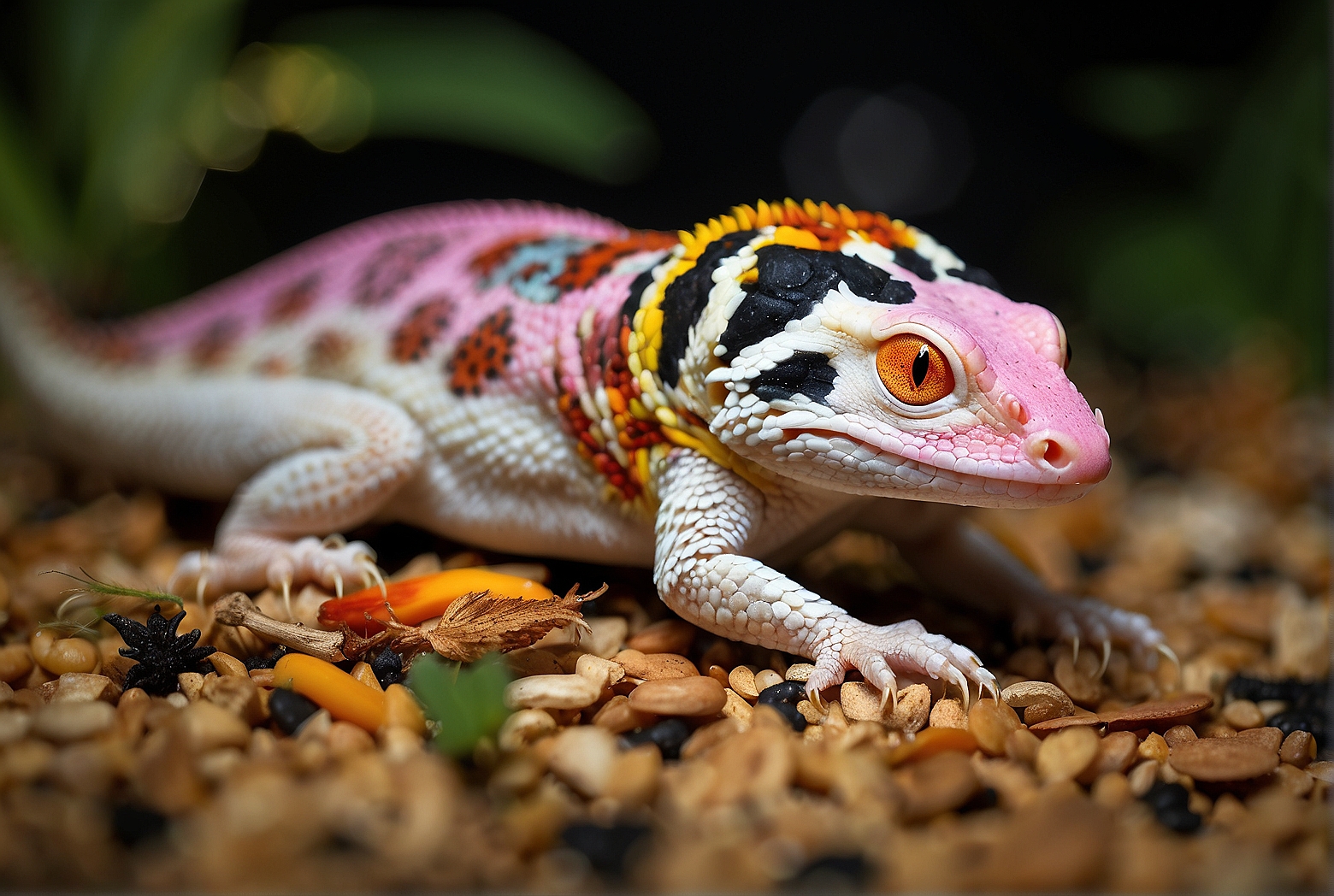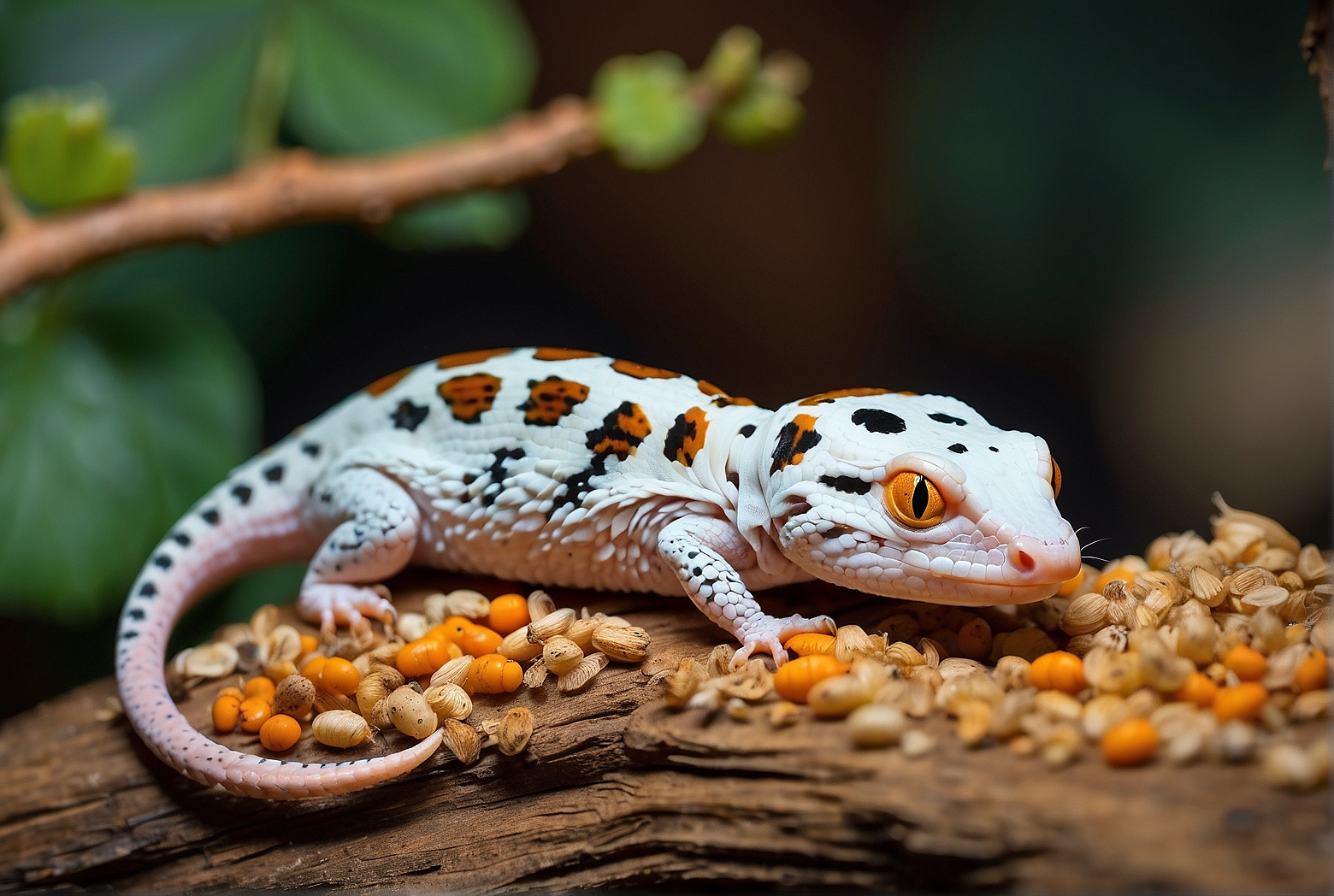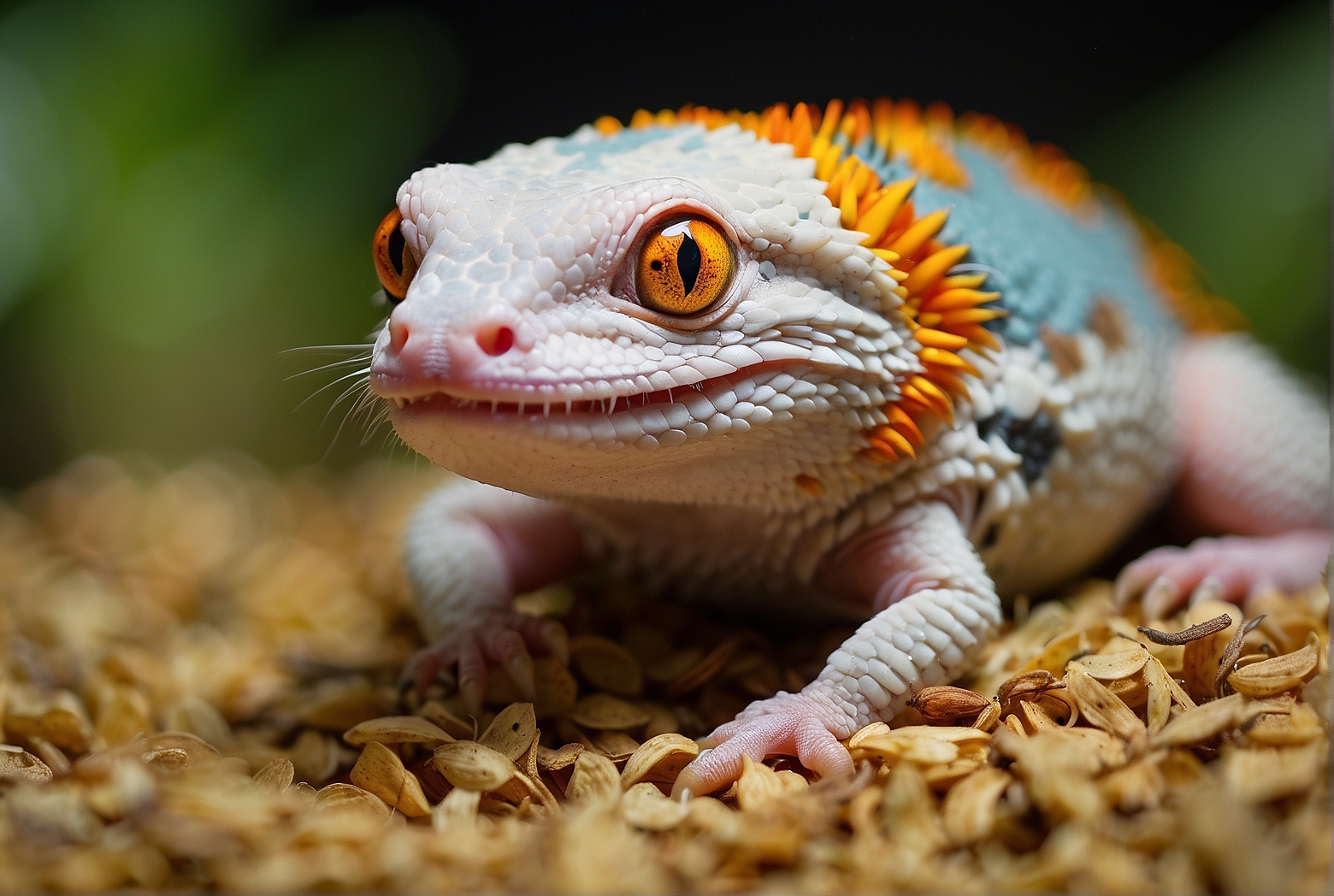Imagine having a pet that not only adds a touch of exotic beauty to your home, but also thrives on a unique diet. Enter the leopard gecko, a mesmerizing reptile that requires a specific type of nourishment to stay healthy and happy. In this article, we will explore the fascinating world of leopard gecko food with insects, delving into the benefits and considerations of this dietary choice. So, get ready to uncover the secrets of providing your leopard gecko with a delicious and nutritious meal that will keep them glowing with vitality.
Importance of a balanced diet for leopard geckos
Provide essential nutrients
A balanced diet is crucial for the overall health and well-being of leopard geckos. Providing a variety of nutrient-rich foods ensures that they receive all the essential nutrients they need. Insects are the main staple of a leopard gecko’s diet, as they offer a high protein content and are easily digestible for these reptiles.
Support growth and development
Leopard geckos go through various stages of growth and development throughout their lives. A balanced diet plays a vital role in supporting these processes. Adequate protein intake is particularly important for young geckos as they are actively growing. Insects such as crickets, mealworms, dubia roaches, and silkworms are excellent options to ensure proper growth in leopard geckos.
Maintain overall health
A well-balanced diet is essential for maintaining the overall health of leopard geckos. Including a variety of insects in their diet provides not only essential nutrients but also helps prevent deficiencies and associated health issues. A balanced diet supports a strong immune system, healthy skin and scales, and optimal organ function in these reptiles.
Types of insects suitable for leopard geckos
Crickets
Crickets are a popular choice when it comes to feeding leopard geckos. They are readily available, easy to handle, and provide excellent nutrition. However, it is crucial to ensure that the crickets are appropriately sized for the gecko, as excessively large crickets may cause choking or digestive issues.
Mealworms
Mealworms are another commonly fed insect to leopard geckos. They are easy to obtain, and geckos generally enjoy their taste. However, it is essential to note that mealworms have a high fat content, so they should be fed in moderation to prevent obesity in leopard geckos.

Dubia Roaches
Dubia roaches are an excellent option for leopard geckos as they have a balanced calcium to phosphorus ratio. This is important for maintaining proper bone health and preventing metabolic bone disease. They are also low in fat, making them a healthy choice for geckos.
Silkworms
Silkworms are highly nutritious and have a soft exoskeleton, making them easy to digest for leopard geckos. They are a good source of protein, calcium, and essential amino acids. Silkworms also contain high amounts of moisture, helping to keep geckos hydrated.
Feeding frequency and portion size
Feeding schedule for adult leopard geckos
Adult leopard geckos should be fed every other day to maintain a healthy weight. Offering a variety of insects during each feeding session ensures they receive a balanced diet. It is recommended to provide 3-5 appropriately sized insects per feeding, depending on the size of the gecko.
Feeding schedule for juvenile leopard geckos
Juvenile leopard geckos have higher energy requirements due to their rapid growth. They should be fed daily to support their development. Providing a larger number of smaller-sized insects is more beneficial for their nutritional needs. It is recommended to offer 4-6 appropriately sized insects per feeding.
Determining portion size based on gecko’s size
The portion size of insects should be determined based on the size of the leopard gecko. As a general rule, the length of the insect should not exceed the width of the gecko’s head. This ensures that the prey is an appropriate size for easy consumption and digestion. Monitoring the gecko’s behavior and weight can also help determine if adjustments to portion sizes are necessary.
Gut-loading insects for optimal nutrition
Importance of gut-loading
Gut-loading is the practice of feeding nutrient-rich foods to insects before offering them to leopard geckos. This allows the insects to become a concentrated source of essential nutrients. Gut-loading helps ensure that geckos receive a well-rounded diet and maximizes the nutritional value of the insects they consume.

Recommended gut-loading foods
There are several foods that are suitable for gut-loading insects. High-calcium options such as dark leafy greens, carrots, or calcium powder can help increase the calcium content of the prey. Other nutritious options include fruits, vegetables, and commercial gut-loading diets specifically designed for insects.
Gut-loading techniques
To gut-load insects effectively, provide them with the desired foods for at least 24-48 hours before feeding them to the leopard geckos. It is crucial to make sure the prey has had enough time to consume the nutrient-rich foods. Feeder insects can be kept in a separate container with the gut-loading foods to ensure they have ample opportunity to feed before being offered to the geckos.
Supplementing leopard gecko diet with vitamins and minerals
Calcium supplementation
Calcium supplementation is essential for leopard geckos, as they require adequate calcium for proper bone health and to prevent metabolic bone disease. Calcium powder specifically formulated for reptiles can be dusted onto the insects before feeding. It is recommended to dust the prey with calcium powder at least once or twice a week.
Vitamin D3 supplementation
Vitamin D3 is necessary for the absorption and utilization of calcium in leopard geckos. Without adequate vitamin D3, geckos may experience calcium deficiencies, which can lead to health problems. Vitamin D3 can be obtained through proper exposure to UVB lighting or by using specially formulated reptile vitamin supplements.
Other essential supplements
In addition to calcium and vitamin D3, leopard geckos may benefit from other supplements to ensure they receive a well-rounded diet. Multivitamin supplements designed for reptiles can provide a range of essential vitamins and minerals. These supplements should be used sparingly, following the manufacturer’s recommended dosage.
Offering variety in the diet
Introducing different insect species
It is important to offer a variety of insect species in a leopard gecko’s diet to ensure they receive a wide range of nutrients. Rotating between crickets, mealworms, dubia roaches, and silkworms provides different protein and fat profiles, enriching the gecko’s diet. This variety also prevents geckos from becoming too selective or bored with their food options.
Feeding occasional treats
Occasional treats can be offered to leopard geckos to add some excitement to their diet. Waxworms or superworms can be given as treats, but in moderation, as they are high in fat. Treats should never make up a significant portion of the gecko’s diet and should be given sparingly to maintain a balanced nutrition profile.
Rotating insect types
In addition to introducing different insect species, it is beneficial to rotate the types of insects within a species. For example, if offering crickets, consider feeding them gut-loaded crickets one day and dusted crickets the next. This rotation ensures that the gecko receives a varied nutrient profile and minimizes the risk of deficiencies or excesses in specific nutrients.
Hydration needs of leopard geckos
Providing a shallow water dish
Leopard geckos require access to fresh water at all times. A shallow water dish should be provided in their enclosure, allowing them to drink as needed. The dish should be cleaned regularly to ensure cleanliness and prevent the growth of bacteria.
Misting enclosure to maintain humidity
Leopard geckos have low moisture requirements and typically obtain the majority of their water intake through their prey. However, misting the enclosure with water can help maintain the necessary humidity levels and provide additional moisture for the gecko. It is important to avoid excessive moisture, as it can lead to respiratory issues.
Avoiding excess moisture
Although leopard geckos require some humidity, it is crucial to avoid excessive moisture in their enclosure. High humidity levels can contribute to the growth of bacteria or fungi and may lead to respiratory problems or skin infections in geckos. Proper ventilation and regular monitoring of humidity levels can help prevent these issues.
Avoiding toxic insects
Harmful insects to avoid feeding
There are certain insects that should never be fed to leopard geckos due to their toxic nature. Fireflies, ants, and beetles are examples of insects that can be harmful or even fatal if consumed by geckos. It is essential to ensure that the insects offered to leopard geckos are safe and free from any potential toxins.
Identifying potential dangers
When sourcing insects for leopard geckos, it is crucial to be aware of the potential dangers. Insects collected from areas treated with pesticides or insecticides may contain traces of these harmful chemicals. It is best to obtain insects from reputable breeders or suppliers to ensure their safety for the geckos.
Ensuring safe sources of insects
To ensure the safety of the insects provided to leopard geckos, it is recommended to purchase from reputable sources. Breeders or suppliers who can guarantee the quality and safety of their insects should be preferred. Additionally, avoiding collecting insects from the wild is advisable, as it can be challenging to determine any potential risks they may pose.
Supporting leopard geckos with specialty diets
Feeding geckos with specific dietary needs
Some leopard geckos may have specific dietary needs due to health conditions or individual requirements. For example, geckos with calcium deficiencies may need additional calcium-rich foods or supplements. It is essential to work closely with a veterinarian or reptile nutritionist to develop a specialized diet plan to meet the specific needs of these geckos.
Baby gecko food options
Baby leopard geckos require a diet rich in protein and calcium for healthy growth. In addition to the staple insects mentioned earlier, small-sized mealworms and pinhead crickets can be offered to meet their nutritional requirements. It is important to consider their small size and adjust portion sizes accordingly to prevent overfeeding.
Older gecko food options
As leopard geckos age, their activity levels and metabolism may decrease. It is crucial to adjust their diet accordingly to prevent obesity. Offering a variety of smaller insects, such as small-sized crickets or mealworms, can help ensure they receive adequate nutrition without excessive calorie intake.
Monitoring gecko’s health and digestion
Signs of healthy digestion
Monitoring the health and digestion of leopard geckos is essential for ensuring their well-being. Healthy digestion is indicated by regular bowel movements, firm and well-formed stools, and an overall active and alert behavior. Any changes in eating patterns, stool consistency, or behavior should be noted and monitored closely.
Common digestive issues in geckos
Leopard geckos can experience digestive issues, such as constipation or impaction, which can be caused by inadequate hydration or inappropriate prey sizes. These issues can be identified by changes in bowel movements, lack of appetite, or signs of discomfort. Providing proper hydration, monitoring portion sizes, and adjusting the diet can help prevent and alleviate digestive problems.
When to consult a veterinarian
If there are concerns about the health or digestion of a leopard gecko, it is important to consult a reptile veterinarian. They can provide proper diagnosis and treatment if any issues are identified. Regular veterinary check-ups are also recommended to ensure the overall health and well-being of leopard geckos.
In conclusion, providing a balanced diet for leopard geckos is crucial for their essential nutrient intake, growth and development, and overall health. Offering a variety of suitable insects, maintaining a proper feeding schedule, and ensuring optimal nutrition through gut-loading and supplementation are essential aspects of leopard gecko care. It is also important to consider their hydration needs, avoid toxic insects, offer dietary variety, and monitor their health and digestion. By following these guidelines and working closely with a veterinarian, leopard gecko owners can ensure the long-term health and happiness of their beloved pets.
